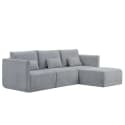 Credit:
Credit:
Recommendations are independently chosen by Reviewed's editors. Purchases made through the links below may earn us and our publishing partners a commission.
Introduction
Noise canceling headphones are becoming more and more popular for users who travel often or are sensitive to ambient noise. By reducing noise in the environment, sound canceling headphones prevent outside noise, such as loud airplane engines, from reaching your ear. There are two types of noise reduction headphones, and it’s careful to note which type you’re purchasing.
Passive Noise Cancellation
Beware of headphone specs that claim “passive noise cancellation,” because passive simply blocks outside noise from reaching your ear. In other words, stuffing cotton balls in your ears could be considered “passive noise cancellation.” All headphones have passive noise cancellation to some degree because they are covering your ear. If you’re not terribly concerned with heavy noise reduction but still want to block some noise, go with in-ear headphones – they’re like ear plugs with speakers. On-ear headphones do the worst job blocking outside noise, and over-ear is only slightly better.
Active Noise Cancellation
If noise reduction is what you’re looking for, seek out active noise cancellation headphones. These headphones measure and analyze background noise, then emit “antinoise” of the opposite polarity through a small microphone near the ear to cancel the sound out. This makes it possible to listen to music at lower volumes without the sound being drowned out by ambient background noise.
Noise-canceling was first developed by Bose in 1986, with Sony, Panasonic, and Sennheiser following later. A number of models are currently available, including Sony’s in-ear headphones, the first earbuds to feature active noise cancellation.
Who Should Use Them?
Noise canceling headphones are best for frequent travelers, especially those who travel often by plane. Noise reduction headphones work best in environments where there is a consistent background noise, such as the low hum of an airplane engine. The noise reduction isn’t perfect, though – some ambient noise is still bound to slip through, and there is no headphone on the market that claims 100-percent sound cancellation.

